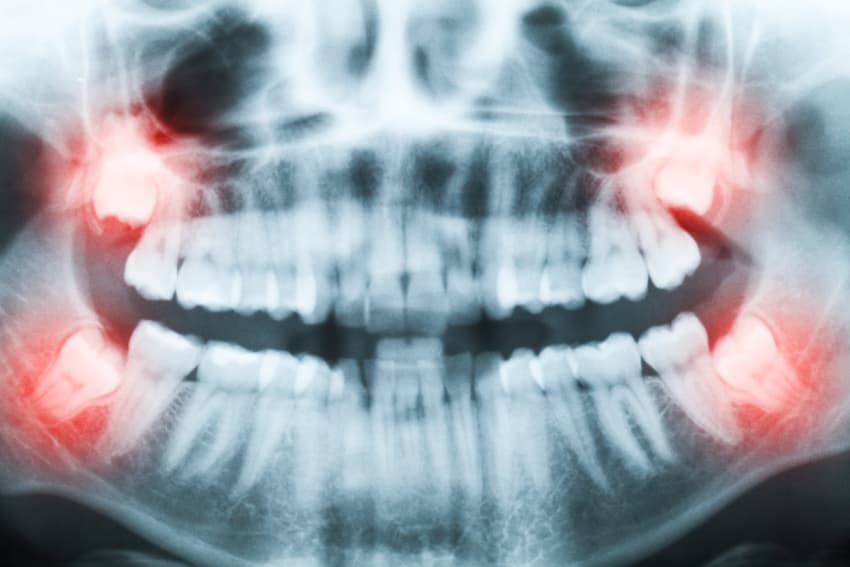
My name is Kyle Hornby and I am a Dentist in Kitchener-Waterloo. Each week I tackle common dental topics to raise the bar on dental health knowledge available to the public. My overall goal is to help patients to need less treatment so they can save money on annual dental fees. This week, I'd like to discuss wisdom tooth removal or (wisdom tooth extraction) and when it's necessary.
It has become increasingly common over the past 50 years or so for Dentists to recommend removal of 3rd molars or "wisdom teeth". In most cases this recommendation is "prophylactic" meaning treatment prevents future negative effects on your health. Some individuals have their wisdom teeth and do not have problems with them. So, why then, is it so common for Dentists to recommend removal of 3rd molars? Below, I hope to provide you with "VIP access" to the Dentist's thought process when recommending wisdom tooth extraction.
In many cases, wisdom teeth don't have enough space to properly erupt. Lower wisdom teeth, in particular, must "squeeze" between 2nd molars in front of them and dense jawbone behind them. To make things worse, the lower jaw curves upward dramatically in the area of the wisdom teeth (see x-ray above near the red illumination). For most people, their 3rd molars are "stuck" in a partially erupted position. In this position, only a small portion of the tooth is visible through the gums. The rest of the tooth is often submerged under the gums and surrounded by deep gum pockets that collect harmful food, plaque and bacteria. This places the patient at an increased risk of tooth decay and soft tissue infection.

An impacted wisdom tooth is one that is unable to fully erupt. This is commonly due to obstruction from an adjacent tooth or jawbone. The most common type of impaction results in a tooth partially covered by gum tissue. The result is a tooth that is very difficult to properly clean.
Most patients are concerned about what they might feel with an impacted wisdom tooth. Others ask about potential damage to adjacent teeth. Here are some of the possible consequences of long-term wisdom tooth impaction:
Removal of impacted 3rd molars is carried out either prophylactically or as an emergency procedure when infection develops. There are 2 main reasons why Dentists recommend 3rd molar extraction early in teenage years (and before related problems arise).
The first is that, between 12-16, wisdom tooth roots are early in their development. These roots are small and far away from major nerves and arteries. Waiting to extract these teeth until further in development increases the risk of post-operative nerve damage. The second reason for early prophylactic removal is that you maintain more jawbone during healing. Patients who wait until there 30s or 40s to remove wisdom teeth typically experience significant bone loss and recession behind there 2nd molars. This leads to root exposure and intense temperature sensitivity. Patients undergoing wisdom tooth extraction in there teenage years do not typically have this same experience.
Is it possible that you keep your wisdom teeth against your Dentist's recommendation and end up okay? ABSOLUTELY. As Dentists, we make recommendations based on the likelihood of a given outcome. However, there are no "crystal balls" in Dentistry. Patients can enjoy significant late-phase jaw growth and, suddenly, their wisdom teeth are free to erupt into optimal position. The most important thing is that you understand risks (if any) associated with maintaining your wisdom teeth and that you play an active role in decisions about your own health.

In most cases, an Oral Surgeon provides wisdom tooth extraction. Some Dentists have undertaken special surgical training to provide wisdom tooth extraction as a service to their patients. It is important to discuss specifics surrounding wisdom tooth removal with your Family Dentist. Importantly, there is a wide array of sedation options available to you for the procedure. I also encourage you to ask your Family Dentist if they provide impacted wisdom tooth extraction. The benefit of having a capable Family Dentist who can remove your wisdom teeth is that you can avoid elevated fees associated with specialist treatment.
For a wisdom tooth assessment, please call us today at (519) 576-8160 to arrange a specific exam or 2nd opinion consult with Kitchener Dentist Dr. Kyle Hornby.
This article is intended to promote understanding of and knowledge about general oral health topics. It is not intended to be a substitute for professional advice, diagnosis or treatment. Always seek the advice of your dentist or other qualified healthcare provider with any questions you may have regarding a dental condition or treatment.
